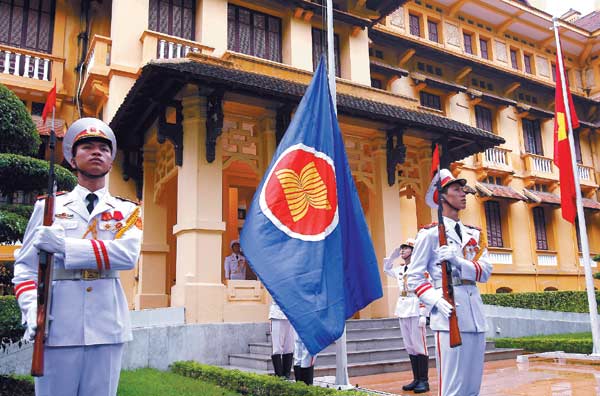
South China Sea issue expected to be discussed during three-country visit
Foreign Minister Yang Jiechi embarked on a three-stop visit to Southeast Asia on Thursday, in which the South China Sea issue is expected to top discussions.
 |
|
Honor guards raise the Association of Southeast Asian Nations flag at a flag raising ceremony to mark the 45th anniversary of the regional group at Vietnam's Ministry of Foreign Aff airs in Hanoi, Vietnam, on Wednesday.?[Photo/Agencies] |
Chinese experts believe Yang will seek understanding from the island nations on the territorial issue, including Indonesia, which plays a leading mediating role in discussions inside the Association of Southeast Asian Nations.
The foreign minister will also focus on building better bilateral relations during the trip, as Beijing does not want to see its broad ties with the region dominated by the issue.
Foreign Ministry spokesman Qin Gang said on Wednesday that Yang will pay official visits to Indonesia, Brunei and Malaysia from Thursday to Aug 13, at the invitation of his counterparts from the respective countries.
The visit comes as Beijing’s tensions with Hanoi and Manila in the South China Sea increased in recent months.
China, the Philippines, Vietnam, Malaysia and Brunei all have claims over some islands and waters in the South China Sea.
During his visit, Yang will also co-chair, with Indonesian Foreign Minister Marty Natalegawa, the second meeting of the joint committee for bilateral cooperation between the two governments.
“In my view the Indonesian visit is targeted more at bilateral ties,” said Yang Baoyun, an expert on Southeast Asian studies at Peking University.
Still, he said Beijing recognizes Indonesia’s mediation efforts on the South China Sea issue.
Indonesia has played an active mediating role in discussions on the South China Sea dispute after foreign ministers of the 10-member ASEAN last month failed to issue a joint communique at their meeting in Phnom Penh because they could not agree on a paragraph about territorial disputes.
Natalegawa then embarked on a 36-hour “shuttle diplomacy” tour to the Philippines, Vietnam, Cambodia, Malaysia and Singapore that resulted in ASEAN member states agreeing on a joint statement outlining ASEAN’s six key principles on the issue.
On Wednesday Natalegawa warned of a “risk of further tensions” in the South China Sea if a “collective and common approach” is not soon agreed on. He was referring to a code of conduct on the South China Sea issue designed to reduce tensions.
He said he hoped to compare notes on the South China Sea with Yang during his visit.
Peking University’s Yang Baoyun said the key point on which to achieve consensus in any code of conduct, is that the proposal cannot challenge China’s sovereignty.
“That is the bottom line,” he said.
He said it seems that differences on the South China Sea issue among the Southeast Asian countries have deepened and now dominate their relations with China.
“But I believe the problem has been played up too much by the media, and countries including the US which seek to maximize their own interests.”
US State Department spokesman Patrick Ventrell said on Aug 3 that China raised tensions in the region last month by establishing a city and garrison in the South China Sea.
Three Chinese officials, in the space of 24 hours, slammed the US criticism, with one official summoning a senior US diplomat to the US embassy in Beijing, a rare gesture analysts said shows Beijing’s determined stance on the territorial issue.
Luo Yongkun, an expert on Southeast Asian studies at the China Institutes of Contemporary International Relations, said ASEAN countries’ different opinions on the South China Sea issue have yielded negative influence over the 10-nation bloc’s integration process.
However, economic differences are the key obstacle, Luo said.
Recent development in the South China Sea issue also drew attention from other neighboring countries, such as India.
“The stakes in the South China Sea have been raised and tension is set to escalate. India too could find itself being drawn in to the dispute,” a column carried by Mumbai-based newspaper DNA, said on Tuesday.
Also on Tuesday India’s Navy Chief Admiral Nirmal Verma ruled out any active deployment in the South China Sea claiming that India’s primary area of focus remains the Indian Ocean.
“At this point of time, the Pacific and South China Sea are of concern to the global community, but in terms of any active deployment from our side, it is not on the cards,” Verma said.
Contact the writers at lixiaokun@chinadaily.com.cn and zhouwa@chinadaily.com.cn
AFP contributed to this story.







